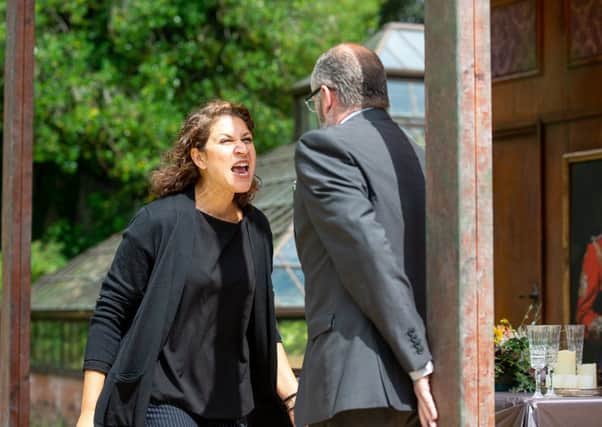Theatre reviews: Hamlet and Richard III, Botanics, Glasgow


This year’s second pair of productions therefore focuses on Hamlet (****) – played with a fabulous, gleaming emotional intelligence by Nicole Cooper, as a powerful female heir to the throne of Denmark – and on Richard III (****) the twisted royal anti-hero whose unjust and murderous seizure of the crown not only prefigures Macbeth but clamours with echoes of our own troubled time.
Inspired by the scene in which Hamlet asks her mother, Gertrude, to compare a portrait of her father with that of Gertrude’s new husband Claudius, the old king’s murdering brother, director Gordon Barr sets the play on a simple but remarkably effective stage dominated by the two portraits, and by a table which acts as a constant reminder of the twin feasts – funeral and wedding – that trigger Hamlet’s crisis of conscience.
Advertisement
Hide AdHere, Cooper follows up her remarkable Coriolanus of 2016 and Timon of 2017 with a performance that stakes an unforgettable female claim to the story of Hamlet’s journey between an old world of machismo and vengeance and a new one of profound grief, self-questioning, vulnerability, intellectual playfulness, creative joy and love – for Stephanie McGregor’s fine Ophelia – which shines briefly within Hamlet’s grasp and then is swallowed again in blood and brutalism.
There’s a slight bungling of the play’s conclusion, with ill-chosen vocal music drowning out the sweet prince’s dying words, and no chance for the final moment of grief and reflection that Shakespeare demands.
From Hamlet’s soliloquies, though, through Ophelia’s madness to the final sword-fight, there are moments in this show that lie closer to the heart of the play than any production I have seen; and at its heart a performance that deserves a nightly standing ovation as well as the attention of everyone who cares about the future of theatre in Scotland.
Jennifer Dick’s Kibble Palace production of Richard III is a rougher piece of work by comparison, full of raw and shocking electro-rock riffs that highlight the play’s contemporary resonances. Almost throughout, in Dick’s modern-dress five-handed version, Richard’s henchman Buckingham (brilliantly played by Adam Donaldson) can be seen snapping phone images of Richard’s ascent to power for immediate dispatch to social media; and when he is finally defeated it’s clear that his successor, Henry Tudor, will be using exactly the same tricks to burnish his own image.
There is, nonetheless, something timeless about Robert Elkin’s blazingly intense performance in the title role. And with Vanessa Coffey offering memorably clear and intense opposition as his sister-in-law Elizabeth, mother of the murdered princes in the Tower, Elkin powers out the mighty verses in which Shakespeare charts Richard’s rise and downfall with a lurid force that is both memorable and horrifying, in a setting that leaves the audience literally within an arm’s length of the action, and often forced into complicity with Richard’s hideous politics, and worse deeds. - Joyce McMillan
Both shows run until 3 August